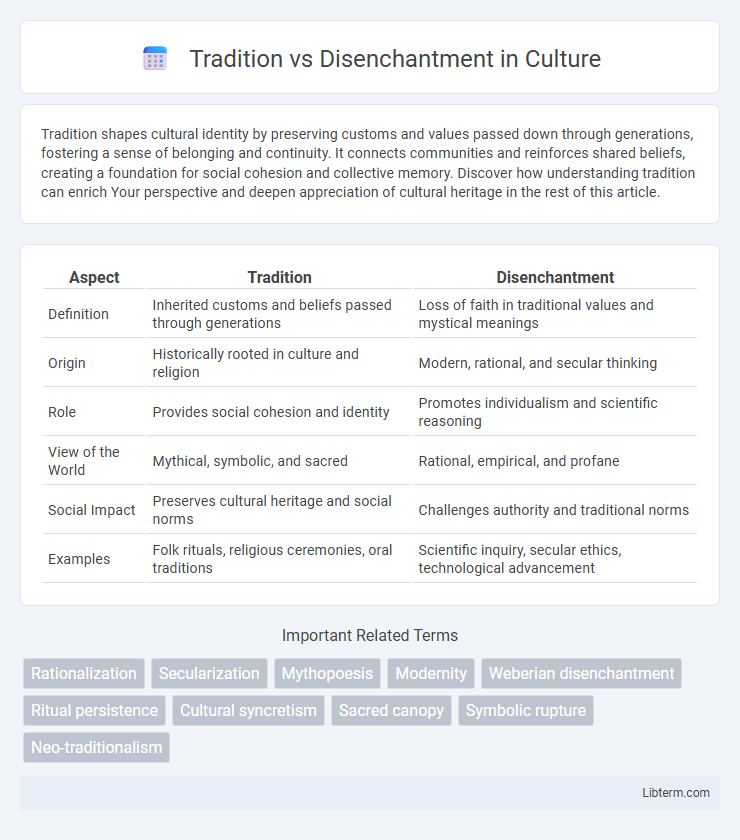Tradition shapes cultural identity by preserving customs and values passed down through generations, fostering a sense of belonging and continuity. It connects communities and reinforces shared beliefs, creating a foundation for social cohesion and collective memory. Discover how understanding tradition can enrich Your perspective and deepen appreciation of cultural heritage in the rest of this article.
Table of Comparison
| Aspect | Tradition | Disenchantment |
|---|---|---|
| Definition | Inherited customs and beliefs passed through generations | Loss of faith in traditional values and mystical meanings |
| Origin | Historically rooted in culture and religion | Modern, rational, and secular thinking |
| Role | Provides social cohesion and identity | Promotes individualism and scientific reasoning |
| View of the World | Mythical, symbolic, and sacred | Rational, empirical, and profane |
| Social Impact | Preserves cultural heritage and social norms | Challenges authority and traditional norms |
| Examples | Folk rituals, religious ceremonies, oral traditions | Scientific inquiry, secular ethics, technological advancement |
Understanding Tradition: Foundations and Values
Tradition serves as the foundation for cultural identity, rooted in established customs, rituals, and collective memories that reinforce social cohesion and continuity. It embodies shared values and ethical principles transmitted across generations, providing a framework for behavior and communal belonging. Understanding tradition requires recognizing its role in maintaining stability and offering meaning within societies by connecting past experiences to present practices.
The Rise of Disenchantment: Origins and Meaning
The rise of disenchantment traces back to the Enlightenment era, marked by a shift from traditional religious and mythological worldviews to rationalism and scientific inquiry. Sociologist Max Weber coined "disenchantment" (Entzauberung) to describe the process by which magical and mystical interpretations of the world were replaced by empirical reasoning and bureaucratic order. This transformation fundamentally altered societal values and individual self-understanding, fostering a culture that prioritizes secularism, technological progress, and critical thinking over inherited traditions.
Tradition’s Role in Shaping Identity
Tradition plays a crucial role in shaping identity by providing a shared set of customs, values, and beliefs that connect individuals to their cultural heritage. It fosters a sense of belonging and continuity, offering stability in times of change by linking generations through rituals and collective memory. The preservation of tradition helps maintain social cohesion and reinforces individual and group identity within a community.
Disenchantment in the Modern Age
Disenchantment in the modern age reflects the shift from traditional, belief-based worldviews to rational, scientific understanding, leading to a more secular and bureaucratic society. Max Weber identified this process as the "rationalization" of life, where magical and mystical explanations are replaced by logic and empirical evidence. This transformation impacts social structures, diminishing the influence of religion and myth while promoting technological progress and individual autonomy.
The Clash: Where Tradition Meets Modern Skepticism
The clash between tradition and disenchantment highlights the tension where long-held cultural beliefs confront modern skepticism rooted in rationalism and scientific inquiry. Traditional values often emphasize community, spirituality, and historical continuity, while disenchantment challenges these through critical thinking, empirical evidence, and secularism. This dynamic interaction shapes contemporary society by questioning inherited norms and fostering new worldviews based on reason and individual autonomy.
Social Impacts of Losing Tradition
Losing tradition often leads to weakened social cohesion as communities lose shared values and rituals that foster identity and belonging. This erosion can result in increased feelings of alienation and social fragmentation, as well as diminished intergenerational knowledge transfer. The decline of traditional practices may also impair social trust and cooperation, undermining communal support systems essential for societal resilience.
Rationality vs. Ritual: Competing Worldviews
Tradition emphasizes ritual as a means of maintaining social cohesion and cultural identity, relying on inherited customs and symbolic practices to give life meaning. In contrast, disenchantment prioritizes rationality, advocating for a worldview grounded in empirical evidence, logic, and scientific inquiry over mystical or ritualistic explanations. This tension between ritual-driven tradition and rationalist disenchantment highlights a fundamental conflict between emotional, communal belonging and objective, individual analysis in shaping human understanding.
The Emotional Costs of Disenchantment
Disenchantment erodes the deep emotional fulfillment traditionally rooted in collective rituals and shared beliefs, leaving individuals vulnerable to existential isolation. The decline of communal meaning aggravates feelings of alienation and anxiety, undermining social cohesion and personal well-being. Emotional costs manifest as diminished hope and a pervasive sense of spiritual emptiness, challenging the human need for connection and purpose.
Reimagining Tradition for Contemporary Life
Reimagining tradition for contemporary life involves adapting cultural customs to reflect modern values and diverse perspectives while preserving their core meanings. This approach fosters engagement by integrating technology, evolving social norms, and inclusive practices that honor heritage without stagnation. Emphasizing dynamic continuity over rigid preservation allows traditions to remain relevant and meaningful in rapidly changing societies.
Bridging the Divide: Is Reconciliation Possible?
Bridging the divide between tradition and disenchantment requires acknowledging the value of cultural heritage while embracing modern critical perspectives that question established norms. Reconciliation is possible through dialogue that respects emotional connections to tradition alongside rational inquiry, fostering mutual understanding. Integrating indigenous knowledge systems with contemporary scientific approaches can create a holistic framework that honors both continuity and progress.
Tradition Infographic

 libterm.com
libterm.com